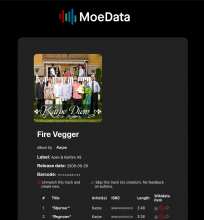Trying to get the react app MoeData to work in Toolforge. The application uses "react-router" and is client-side only. The applications use of router require costume configuration for the web interface. There will be use of lighttpd. There are two route areas that needs to be configured:
- https://moedata.toolforge.org/album/* (example: https://moedata.toolforge.org/album/2ABAeQdTwWlZZj4cW2zOWX)
- https://moedata.toolforge.org/artist/*
The tool will be used on the uri "https://<toolname>.toolforge.org". To simplify the configuration.
